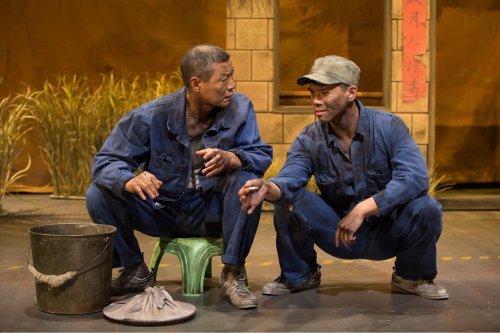The World of Extreme Happiness
Scathing exposé of women’s roles and rural immigrants to the cities in the workers’ paradise of modern China will shock, but always keep you fascinated.

Jo Mei, Jennifer Lim and Francis Jue in a scene from “The World of Extreme Happiness” (Photo credit: Matthew Murphy)
[avatar user=”Victor Gluck” size=”96″ align=”left” ] Victor Gluck, Editor-in-Chief[/avatar] The name of Frances Ya-Chu Cowhig’s new play, The World of Extreme Happiness, being given a co-production by New York’s Manhattan Theatre Club and Chicago’s Goodman Theatre, could not be more ironic. Set in contemporary China, the play depicts a world in which girl children are resented while the boys are given an education. People from farming communities who move to the cities are looked down upon as peasants and have few rights. It is impossible to work your way out of the class into which you have been born. The World of Extreme Happiness is a scathing indictment of life in the worker’s paradise where very few have the things that would bring them contentment. Eric Ting’s production will most likely startle as well shock you with its view of a world most of us know little or nothing about.
The story follows the life and career of the satirically named Sunny Li whose life is anything but unclouded starting with her birth in a rural coal mining community where her father already shows signs of illness. Her parents try to suffocate her at birth as they hoped for a boy, but she survives. Her mother dies in giving birth to her younger brother Peter, while her father throws his energies into raising pigeons. Unable to afford an education, Sunny moves to the city of Shenzhen but ends up working in a factory as a janitor cleaning toilets in order to send home money to pay for her brother’s schooling. Although in a dead-end job, Sunny imagines that it will lead to promotion and financial security. Unfortunately, her elderly and cynical boss warns her that there are many men ahead of her who have waited decades for such a chance.
With co-worker Ming Ming, Sunny attends a lecture by self-help guru Mr. Destiny and she is given a new lease on life. When her factory offers a contest to pick a representative contented “Factory Girl” for a public relations event to counteract news of many worker suicides, Sunny applies as the prize is an office job. Although she wins the contest, things do not work out the way she hoped. The scenes with Sunny alternate with those between the owner of the factory James Lin and his girlfriend, the chic and sophisticated Artemis Chang, Vice President of Price-Smart China, a multinational corporation. James and Artemis are representative members of the new Chinese bourgeoisie.

James Saito and Telly Leung in a scene from “The World of Extreme Happiness” (Photo credit: Matthew Murphy)
While this plot summary may sound depressing, under Ting’s assured direction the play is always compelling in the manner of a documentary. The only actor playing one role, Jennifer Lim as Sunny Li, travels an enormous arc from subservient peasant to a woman who thinks for herself. The rest of the cast are so completely different in each of their roles that it is necessary to consult the program to recognize them. Contrasting with the initially passive Sunny, Sue Jin Song’s Artemis is an authoritative figure of power while her local midwife Wang Hua is a downtrodden and shrewish woman.
Francis Jue is Sunny’s sarcastic boss as well as the buoyant and cheery Mr. Destiny. Jo Mei is Sunny’s ambitious and amusing coworker Ming-Ming, as well as a fearsome police officer with tremendous powers and, in the opening scene, Sunny and Pete’s defeated mother. James Saito is Sunny and Pete’s abusive yet oppressed father, as well as owner of Jade River Manufacturing where Sunny works. Telly Leung is first seen as Ran Feng(the Li’s rural neighbor who is a local miner and bachelor, and the son of the midwife), and later as Sunny’s quick-tongued teenage brother Pete.
Mimi Lien’s clever scenic design for the 19 swift scenes alternates between an inner and outer stage for the quick segues. The costume design by Jenny Mannis runs the gamut from farmer and coalminer’s outfits to city clothing to the high fashion worn by the upper echelon. Tyler Micoleau’s lighting and Mikhail Fiksel’s sound design add substantially to the success of the play. Thomas Schall is responsible for the convincing fight direction.
Frances Ya-Chu Cowhig’s eye-opening The World of Extreme Happiness reveals the urgent problems in contemporary China in which people from rural communities who move to the cities are second class citizens but where protest is quickly stifled, where the one-child policy causes girl children and women workers to be ignored, and the vast numbers of people in the factory cities have little access to education or money. Eric Ting’s powerful co-production for Manhattan Theatre Club and the Goodman Theatre of Chicago deserves to be seen for turning contemporary social science into the stuff of drama.
The World of Extreme Happiness (through March 29, 2015)
Manhattan Theatre Club in a co-production with the Goodman Theatre (Chicago)
New York City Center Stage I, 131 W. 55th Street, in Manhattan
For tickets call 212-581-1212 or visit http://www.mtc-nyc.org
Running time: one hour and 40 minutes with no intermission






Leave a comment